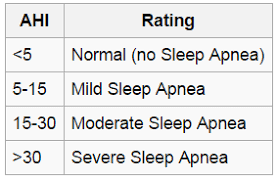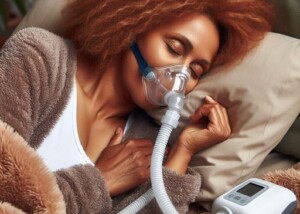
Is it harmful to your body to let sleep apnea go untreated even if you don’t have any daytime symptoms? Or should you still use a CPAP even though you feel fine?
You’ve been diagnosed with obstructive sleep apnea (OSA).
The idea of using a CPAP machine is unbearable. So you decide to forego it and just hope for the best — because you don’t have any daytime symptoms.
In fact, the only reason you suspect OSA is that your dentist said you have a small airway and a small mouth and jaw, which is why when you were in your 20’s, your wisdom teeth were impacted and had to be removed.
Or perhaps you decided to undergo a sleep study because a family member was diagnosed with OSA.
Nevertheless, you’ve been told you have obstructive sleep apnea.
You’re shocked because you feel great during the day, never fall asleep while watching TV or using the computer, and have gotten by quite well on under eight hours of sleep — and you don’t even take naps.
Not only that, but everything else is normal, including blood pressure and cholesterol profile.
OSA but no daytime symptoms: CPAP or not?
“Yes, about 20% of apneics do not experience daytime sleepiness or fatigue,” says Dr. Nancy Foldvary-Schaefer, DO, MS, and Director, Sleep Disorders Center, Cleveland Clinic.
“There is not current good understanding of this. We recognize different phenotypes of OSA: sleepy and non-sleepy — insomnia presentations that have been described through cluster studies.
“This is an active area of research. Older, obese males are one population of OSA that can be severe OSA but without daytime sleepiness. This work has not been well-replicated.”
But should people with OSA who have all the energy in the world and can easily stay awake during long drives still use a CPAP machine?
“Recurrent apneas produce the same effects regardless of whether or not daytime symptoms result,” says Dr. Foldvary-Schaefer.
These are hidden effects — effects occurring inside your body that you can’t see nor necessarily feel in terms of symptoms.
This includes a strain on the heart that, even though during the day you could hammer it in the gym, during sleep the heart is repeatedly stressed.
This can eventually impair the function of the heart.
A study by Gugger et al says that an apnea hypopnea index (AHI) of over 5 is an independent risk factor for heart attack.
This means that even mild sleep apnea — an AHI of 5 to 15 — is a risk factor for a heart attack, even if you don’t have any daytime symptoms; even if you’re of a healthy body weight and don’t smoke or drink; even if you have low blood pressure, work out at a gym and go running a few times a week.

The Gugger study then points out that asymptomatic people with sleep apnea with an AHI of at least 20 should use CPAP.
And that CPAP is also called for in those with an AHI of five to 20 if they also have cardiovascular risk factors currently in place (e.g., obesity, smoking, diabetes, high blood pressure).
These recommendations are not set in stone; they are flexible guidelines, says the paper.
Another paper, in the journal Sleep Disorders, notes that numerous studies have attempted to determine if CPAP therapy reduces cardiovascular risk in patients without daytime sleepiness.
“But it’s difficult to draw definitive conclusions,” says the report.
There have been no studies involving following fitness warrior people with untreated obstructive sleep apnea for years and years to see what, if anything, eventually happens. There may never be.
However, we’ve all heard of the individual who’s “done everything right” for decades, then suddenly drops from a heart attack.
Hmmmm, is it possible that many of these individuals have had asymptomatic, untreated obstructive sleep apnea for decades that finally caught up with them?

 Certified by the American Board of Neurology and Psychiatry in Neurology, Clinical Neurophysiology and Sleep Medicine,
Certified by the American Board of Neurology and Psychiatry in Neurology, Clinical Neurophysiology and Sleep Medicine, 





































